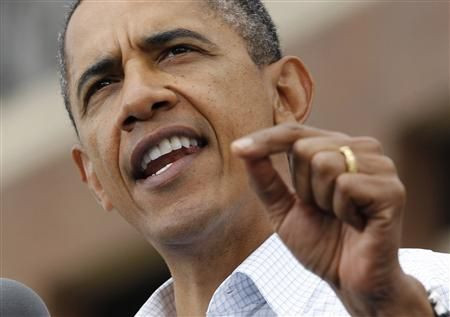Obama Jobs Plan: Will Congress Even Act?

Even before President Barack Obama announces the details of his jobs plan Thursday night, Republicans are lining up to denounce the proposal and in some cases skip the president's speech altogether. The White House has sought to put the onus for a sagging economy on Congress if lawmakers do not act on the plan.
Signs are emerging that the debate over Obama's billion American Jobs Act may be less contentious than this summer's bitter negotiations over raising the debt ceiling, with major deficit reduction now the task of a 12-member supercommittee. Still, the pre-emptive strife demonstrates the challenges Obama will face in getting the bill passed.
The bill will likely include spending aimed at putting Americans back to work fixing the country's deteriorating infrastructure. While some Republicans have denounced that measure as a new version of the reviled 2009 stimulus package -- Senate Majority Leader Mitch McConnell, R-Ky., called it the same failed approach -- House Speaker John Boehner, R-Ohio, and Majority Eric Cantor R-Va. signaled they would be open to more infrastrucure spending.
We are not opposed to initiatives to repair and improve infrastructure, and believe there are reforms that can be implemented that would improve their effectiveness in a manner that supports economic growth, Boehner and Cantor wrote in a letter to Obama.
The tenor of that letter also hinted at a desire to avoid the bitter gridlock of the debt ceiling debate, with Boehner and Cantor writing that neither of us is likely to convince the other in a manner that results in the full implementation of [our] policies ... it is also critical that our differences not preclude us from taking action in areas where there is common agreement.
Cantor has also left open the possibility of supporting Obama's proposal to extend a payroll tax cut set to expire at the end of the year. Obama has advocated strongly to leave in place the cut, which reduces the amount of income most workers pay into Social Security, and he has faced resistance from Republicans who argue that it would minimally affect growth while adding to the deficit.
Despite the overtures from Boehner and Cantor, Obama will need to contend with Republicans who are pushing decreased regulation and tax code agreements as an alternative to his bill. McConnell mocked Obama, saying that you don't lift a single regulation and suddenly claim to be Margaret Thatcher? And the decision of Tea Party influenced Republicans like Joe Walsh, R-Ill., and Paul Broun, R-Ga., to skip the speech suggests that the Tea Party contingent could be formidable in opposing Obama, as they were during the debt talks.
I also look forward to speaking with state leaders who are concerned that the federal government's overreach is making job creation more difficult, Sen. Jim DeMint, R-S.C., a Tea Party patron, wrote in a letter explaining his decision to skip the speech. Unfortunately, the president's policies of spending, debt and over-regulation have been making matters worse, not better.
© Copyright IBTimes 2025. All rights reserved.




















